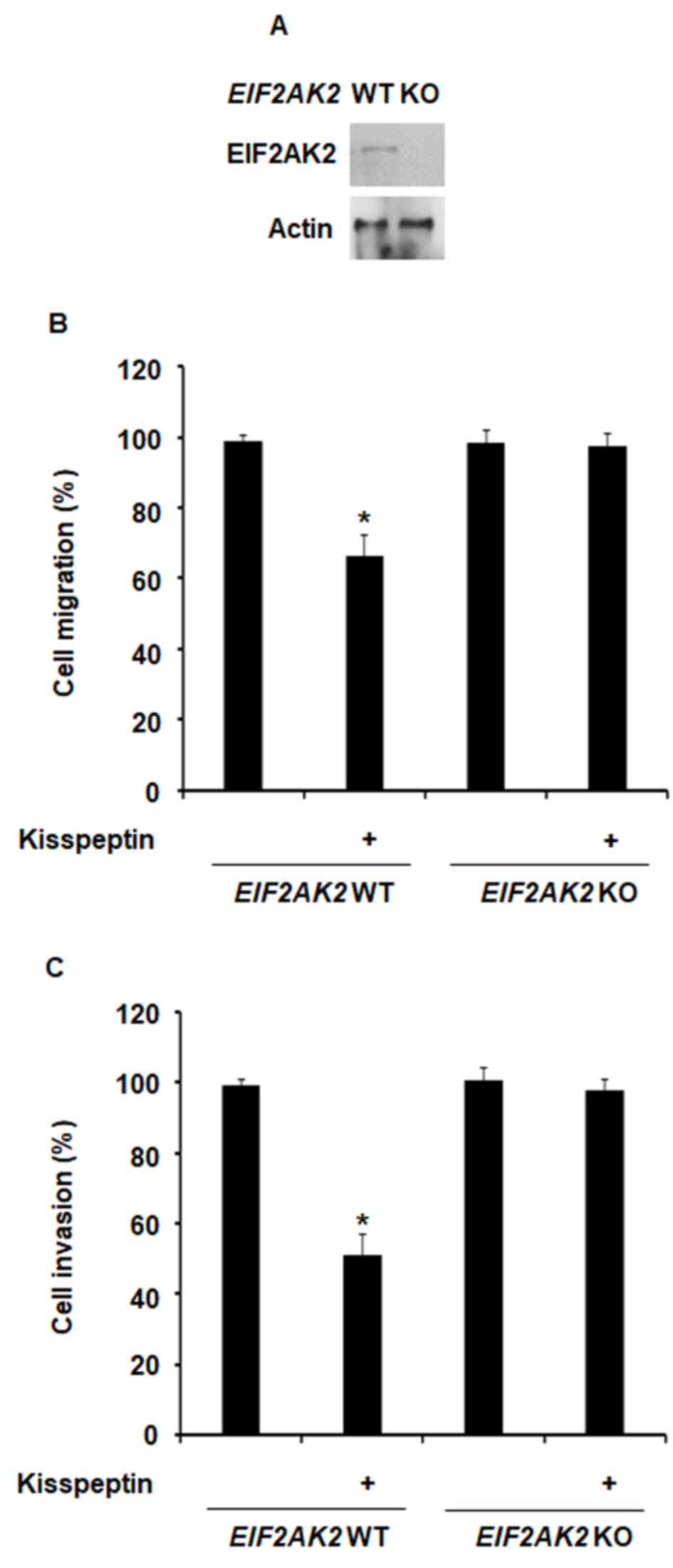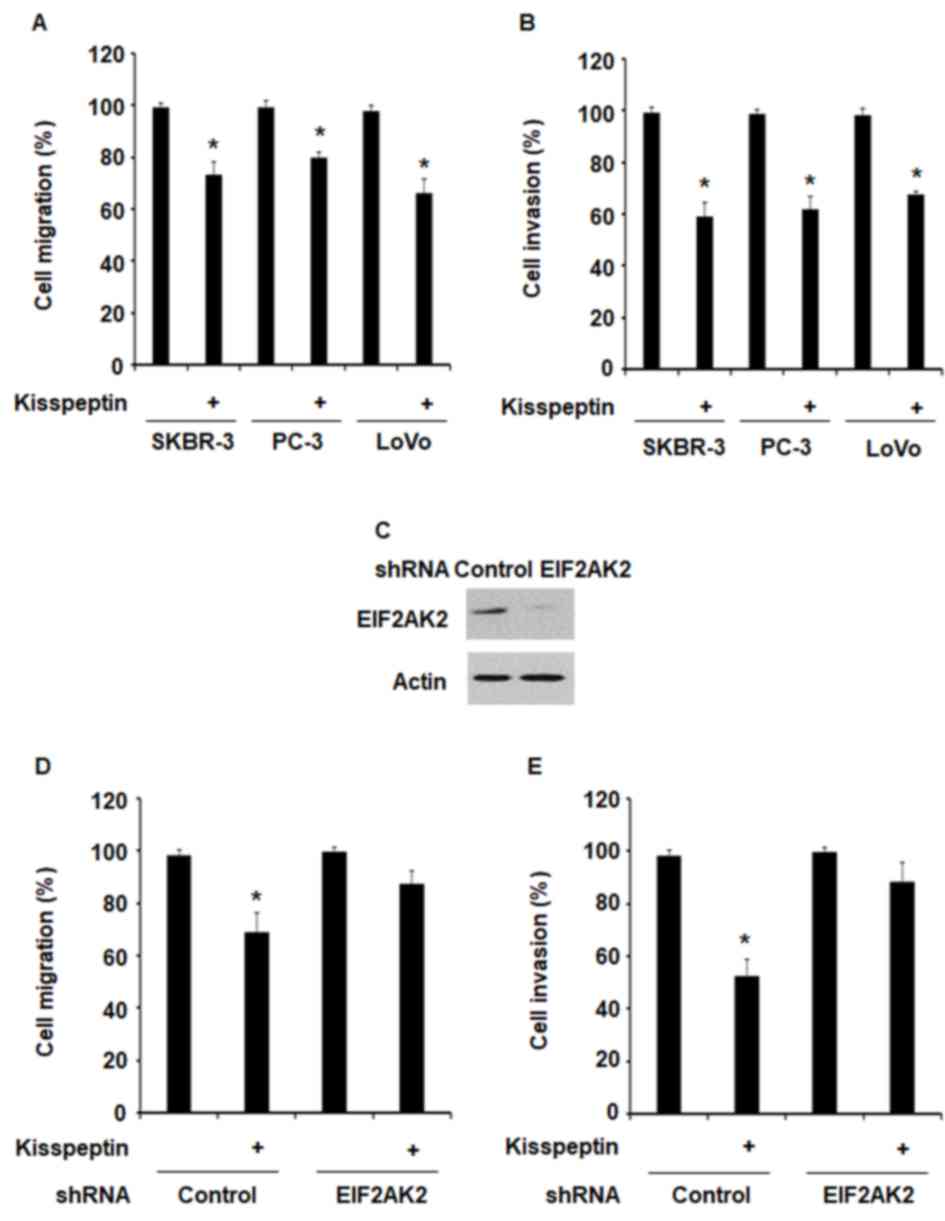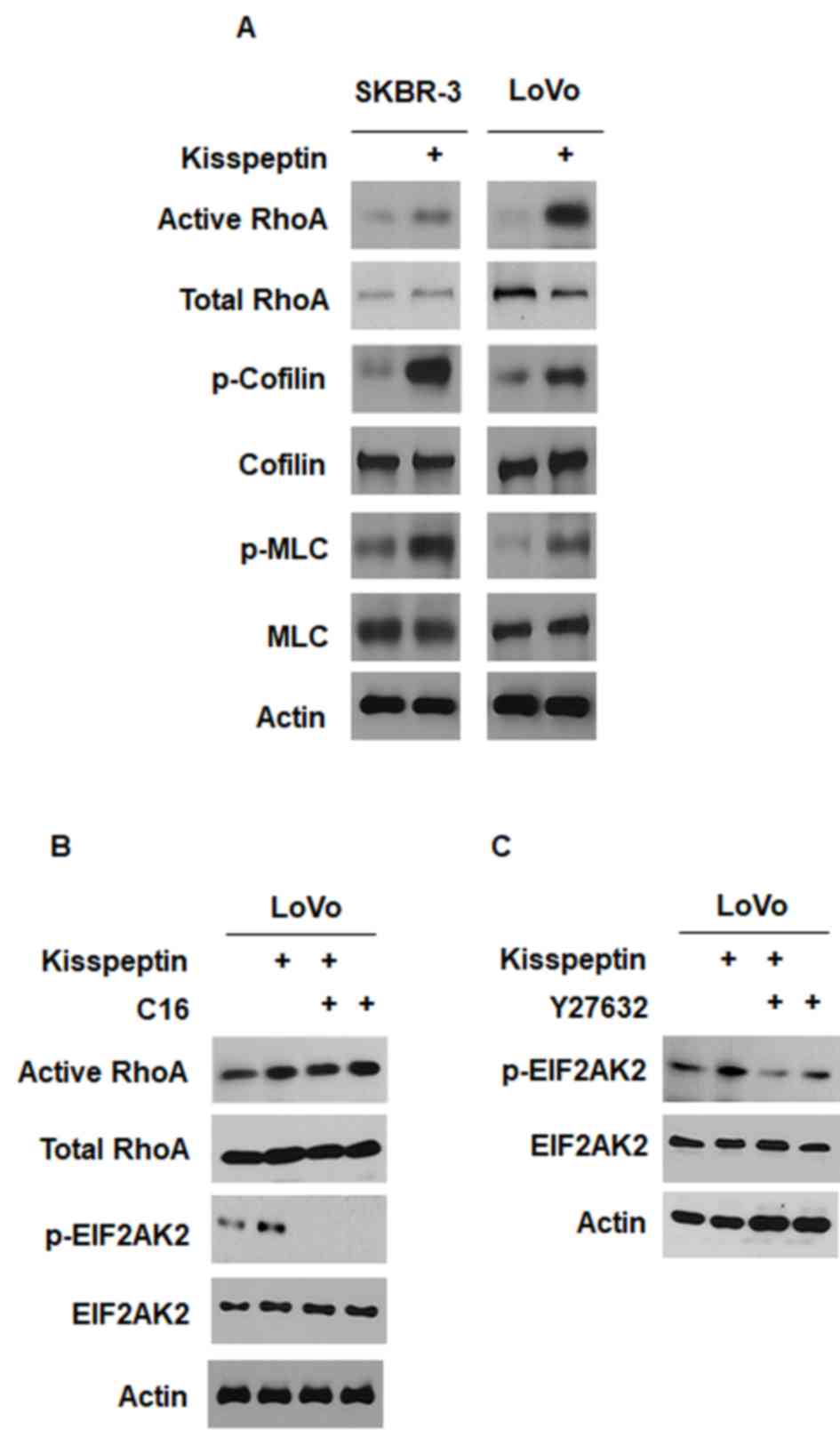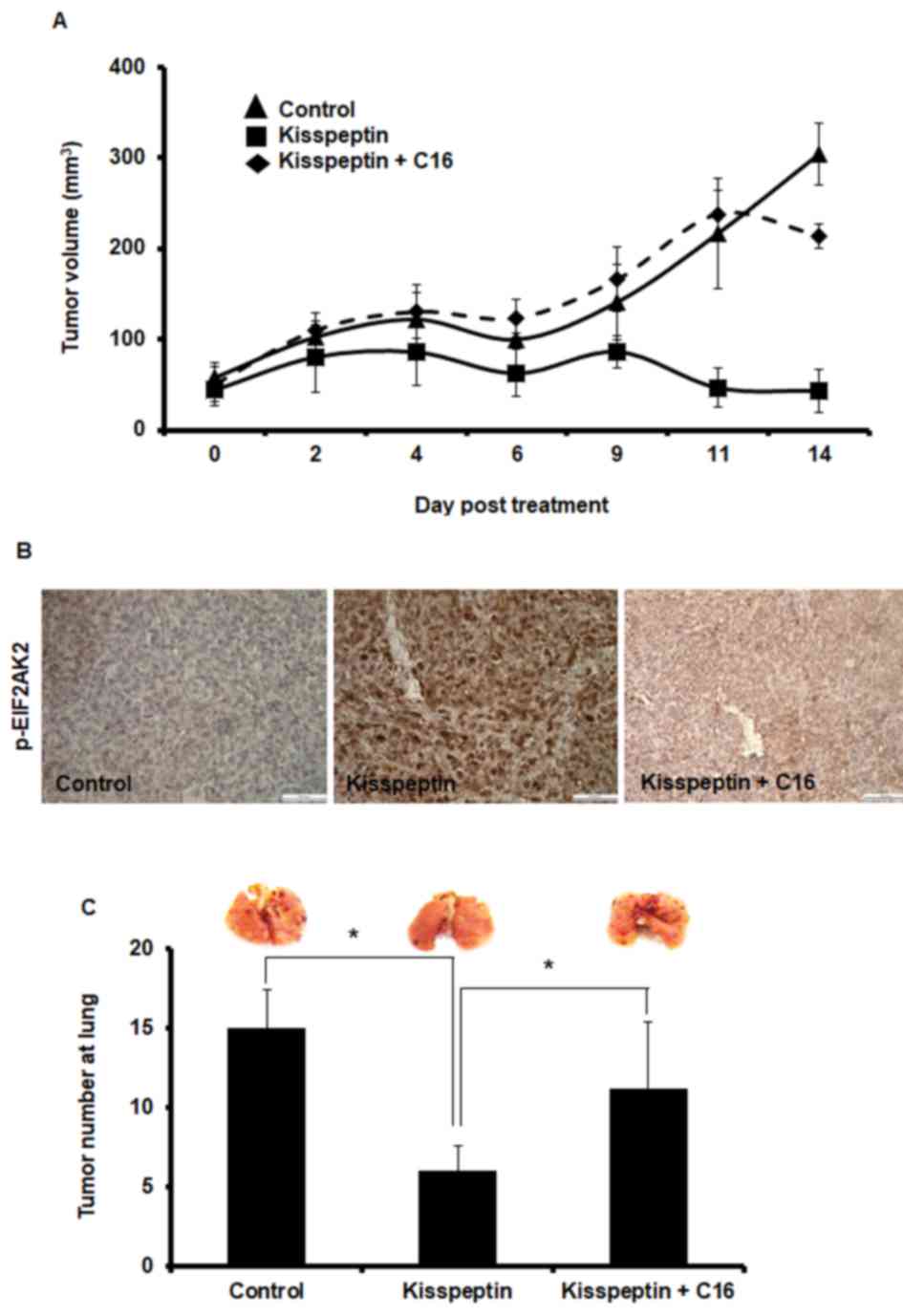|
1
|
Oakley AE, Clifton DK and Steiner RA:
Kisspeptin signaling in the brain. Endocr Rev. 30:713–743. 2009.
View Article : Google Scholar : PubMed/NCBI
|
|
2
|
Colledge WH, Doran J and Mei H: Model
systems for studying kisspeptin signalling: Mice and cells. Adv Exp
Med Biol. 784:481–503. 2013. View Article : Google Scholar : PubMed/NCBI
|
|
3
|
Silveira LG, Latronico AC and Seminara SB:
Kisspeptin and clinical disorders. Adv Exp Med Biol. 784:187–199.
2013. View Article : Google Scholar : PubMed/NCBI
|
|
4
|
Castellano JM and Tena-Sempere M:
Metabolic regulation of kisspeptin. Adv Exp Med Biol. 784:363–383.
2013. View Article : Google Scholar : PubMed/NCBI
|
|
5
|
Cho SG, Li D, Tan K, Siwko SK and Liu M:
KiSS1 and its G-protein-coupled receptor GPR54 in cancer
development and metastasis. Cancer Metastasis Rev. 31:585–591.
2012. View Article : Google Scholar : PubMed/NCBI
|
|
6
|
Lee JH and Welch DR: Suppression of
metastasis in human breast carcinoma MDA-MB-435 cells after
transfection with the metastasis suppressor gene, KiSS-1. Cancer
Res. 57:2384–2387. 1997.PubMed/NCBI
|
|
7
|
Ohtaki T, Shintani Y, Honda S, Matsumoto
H, Hori A, Kanehashi K, Terao Y, Kumano S, Takatsu Y, Masuda Y, et
al: Metastasis suppressor gene KiSS-1 encodes peptide ligand of a
G-protein-coupled receptor. Nature. 411:613–617. 2001. View Article : Google Scholar : PubMed/NCBI
|
|
8
|
Navenot JM, Fujii N and Peiper SC:
Activation of Rho and Rho-associated kinase by GPR54 and KiSS1
metastasis suppressor gene product induces changes of cell
morphology and contributes to apoptosis. Mol Pharmacol.
75:1300–1306. 2009. View Article : Google Scholar : PubMed/NCBI
|
|
9
|
Tan K, Cho SG, Luo W, Yi T, Wu X, Siwko S,
Liu M and Yuan W: KiSS1-induced GPR54 signaling inhibits breast
cancer cell migration and epithelial-mesenchymal transition via
protein kinase D1. Curr Mol Med. 14:652–662. 2014. View Article : Google Scholar : PubMed/NCBI
|
|
10
|
Jiang Y, Berk M, Singh LS, Tan H, Yin L,
Powell CT and Xu Y: KiSS1 suppresses metastasis in human ovarian
cancer via inhibition of protein kinase C alpha. Clin Exp
Metastasis. 22:369–376. 2005. View Article : Google Scholar : PubMed/NCBI
|
|
11
|
Roseweir AK, Katz AA and Millar RP:
Kisspeptin-10 inhibits cell migration in vitro via a receptor-GSK3
beta-FAK feedback loop in HTR8SVneo cells. Placenta. 33:408–415.
2012. View Article : Google Scholar : PubMed/NCBI
|
|
12
|
Cho SG, Li D, Stafford LJ, Luo J,
Rodriguez-Villanueva M, Wang Y and Liu M: KiSS1 suppresses
TNFalpha-induced breast cancer cell invasion via an inhibition of
RhoA-mediated NF-kappaB activation. J Cell Biochem. 107:1139–1149.
2009. View Article : Google Scholar : PubMed/NCBI
|
|
13
|
Stafford LJ, Xia C, Ma W, Cai Y and Liu M:
Identification and characterization of mouse metastasis-suppressor
KiSS1 and its G-protein-coupled receptor. Cancer Res. 62:5399–5404.
2002.PubMed/NCBI
|
|
14
|
Williams BR: PKR; a sentinel kinase for
cellular stress. Oncogene. 18:6112–6120. 1999. View Article : Google Scholar : PubMed/NCBI
|
|
15
|
Meurs EF, Galabru J, Barber GN, Katze MG
and Hovanessian AG: Tumor suppressor function of the
interferon-induced double-stranded RNA-activated protein kinase.
Proc Natl Acad Sci USA. 90:232–236. 1993; View Article : Google Scholar : PubMed/NCBI
|
|
16
|
Hii SI, Hardy L, Crough T, Payne EJ,
Grimmett K, Gill D and McMillan NA: Loss of PKR activity in chronic
lymphocytic leukemia. Int J Cancer. 109:329–335. 2004. View Article : Google Scholar : PubMed/NCBI
|
|
17
|
Shir A and Levitzki A: Inhibition of
glioma growth by tumor-specific activation of double-stranded
RNA-dependent protein kinase PKR. Nat Biotechnol. 20:895–900. 2002.
View Article : Google Scholar : PubMed/NCBI
|
|
18
|
Watanabe MA, Souza L Rodrigues, Murad JM
and De Lucca FL: Antitumor activity induced by regulatory RNA:
Possible role of RNA-dependent protein kinase and nuclear
factor-kappaB. Eur J Pharmacol. 465:205–210. 2003. View Article : Google Scholar : PubMed/NCBI
|
|
19
|
Kim SH, Gunnery S, Choe JK and Mathews MB:
Neoplastic progression in melanoma and colon cancer is associated
with increased expression and activity of the interferon-inducible
protein kinase, PKR. Oncogene. 21:8741–8748. 2002. View Article : Google Scholar : PubMed/NCBI
|
|
20
|
Kim SH, Forman AP, Mathews MB and Gunnery
S: Human breast cancer cells contain elevated levels and activity
of the protein kinase, PKR. Oncogene. 19:3086–3094. 2000.
View Article : Google Scholar : PubMed/NCBI
|
|
21
|
Haines GK, Cajulis R, Hayden R, Duda R,
Talamonti M and Radosevich JA: Expression of the double-stranded
RNA-dependent protein kinase (p68) in human breast tissues. Tumour
Biol. 17:5–12. 1996. View Article : Google Scholar : PubMed/NCBI
|
|
22
|
Savinova O, Joshi B and Jagus R: Abnormal
levels and minimal activity of the dsRNA-activated protein kinase,
PKR, in breast carcinoma cells. Int J Biochem Cell Biol.
31:175–189. 1999. View Article : Google Scholar : PubMed/NCBI
|
|
23
|
Xu M, Chen G, Wang S, Liao M, Frank JA,
Bower KA, Zhang Z, Shi X and Luo J: Double-stranded RNA-dependent
protein kinase regulates the motility of breast cancer cells. PLoS
One. 7:e477212012. View Article : Google Scholar : PubMed/NCBI
|
|
24
|
Yuan X, Wang W, Li J, Zheng P, Dong P,
Chen L, Zhou Y, Xie G, Xu D, Liu Y and Shen L: Gelsolin suppresses
gastric cancer metastasis through inhibition of PKR-p38 signaling.
Oncotarget. 7:53459–53470. 2016. View Article : Google Scholar : PubMed/NCBI
|
|
25
|
Wang X, Dong JH, Zhang WZ, Leng JJ, Cai
SW, Chen MY and Yang X: Double stranded RNA-dependent protein
kinase promotes the tumorigenic phenotype in HepG2 hepatocellular
carcinoma cells by activating STAT3. Oncol Lett. 8:2762–2768.
2014.PubMed/NCBI
|
|
26
|
Irving AT, Wang D, Vasilevski O,
Latchoumanin O, Kozer N, Clayton AH, Szczepny A, Morimoto H, Xu D,
Williams BR and Sadler AJ: Regulation of actin dynamics by protein
kinase R control of gelsolin enforces basal innate immune defense.
Immunity. 36:795–806. 2012. View Article : Google Scholar : PubMed/NCBI
|
|
27
|
Cho SG, Wang Y, Rodriguez M, Tan K, Zhang
W, Luo J, Li D and Liu M: Haploinsufficiency in the prometastasis
Kiss1 receptor Gpr54 delays breast tumor initiation, progression,
and lung metastasis. Cancer Res. 71:6535–6546. 2011. View Article : Google Scholar : PubMed/NCBI
|
|
28
|
Shengbing Z, Feng LJ, Bin W, Lingyun G and
Aimin H: Expression of KiSS-1 gene and its role in invasion and
metastasis of human hepatocellular carcinoma. Anat Rec (Hoboken).
292:1128–1134. 2009. View
Article : Google Scholar : PubMed/NCBI
|
|
29
|
Caino MC, Chae YC, Vaira V, Ferrero S,
Nosotti M, Martin NM, Weeraratna A, O'Connell M, Jernigan D,
Fatatis A, et al: Metabolic stress regulates cytoskeletal dynamics
and metastasis of cancer cells. J Clin Invest. 123:2907–2920. 2013.
View Article : Google Scholar : PubMed/NCBI
|
|
30
|
Pietrocola F, Izzo V, Niso-Santano M,
Vacchelli E, Galluzzi L, Maiuri MC and Kroemer G: Regulation of
autophagy by stress-responsive transcription factors. Semin Cancer
Biol. 23:310–322. 2013. View Article : Google Scholar : PubMed/NCBI
|
|
31
|
Mackeh R, Perdiz D, Lorin S, Codogno P and
Poüs C: Autophagy and microtubules-new story, old players. J Cell
Sci. 126:1071–1080. 2013. View Article : Google Scholar : PubMed/NCBI
|


















